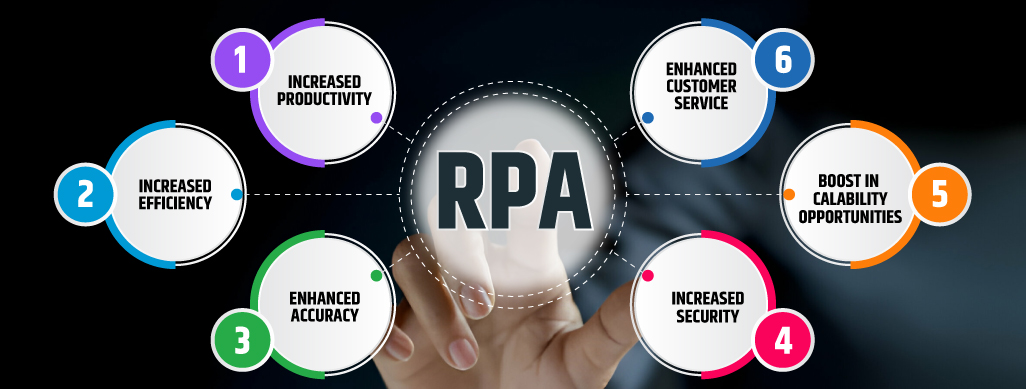
We use cookies to ensure that we give you the best experience on our website.
By using this site, you agree to our use of cookies. Find out more.
In this blog, we will discuss how RPA provides significant benefits to businesses, including increased productivity, efficiency, accuracy, security and scalability opportunities.

Robotic process automation (RPA) has significantly transformed operations across multiple industries through its ability to empower organizations. RPA utilizes software robots or bots to automate repetitive, rules-based tasks previously handled by human workers. This allows valuable employees to shift their focus to more meaningful work. In this blog, we will discuss how RPA provides significant benefits to businesses, including increased productivity, efficiency, accuracy, security and scalability opportunities. We will explore the applications of RPA in industries like finance, healthcare, manufacturing and more. Finally, we will show how automation ultimately enhances customer experience through improved customer service.
Robotic process automation delivers enormous benefits to businesses by automating repetitive, rule-based tasks previously handled by humans. It helps organizations transform their operations by leveraging software robots to streamline workflows and processes. Bots are deployed to take over deterministic jobs that pose challenges like high volumes, low complexity and static nature. This allows valuable human workers to shift their focus to more engaging and strategic work.
By seamlessly integrating into existing IT environments, RPA boosts productivity, improves accuracy, enhances security and drives scalability. It optimizes resource utilization while reducing costs and errors. Overall, automation with RPA lightens the burden of manual labor on employees. They can then concentrate on value-adding functions and customer service that require human skills like critical thinking and personalized attention.
Here are some Applications of RPA In Various Industries:
The finance and banking industry has widely adopted Robotic Process Automation (RPA) to automate repetitive back-office tasks like data entry, invoice processing and payment processing which earlier required manual efforts. RPA has provided value by increasing productivity multi-fold through 24/7 task processing while ensuring enhanced accuracy in operations.
Automating routine finance tasks like account reconciliations and regulatory compliance checks through robots has freed up employee bandwidth to focus on more strategic work. It has also improved efficiency and turned around times by automating workflows. Banks and financial institutions have benefitted from scalable RPA infrastructure that can help easily scale operations vertically and enter new markets without increasing costs.
The manufacturing industry has found Robotics Process Automation (RPA) extremely useful in automating repetitive tasks on production lines like quality inspections and packaging. This has resulted in increased productivity and efficiency gains as robots can work round the clock without breaks. RPA is being leveraged for supply chain tasks like automated purchase order processing, inventory management and warehouse operations to boost accuracy.
By streamlining workflows, RPA has enhanced scalability for manufacturers to scale operations on demand. Automating routine manufacturing tasks has freed up workers to focus on more strategic functions, driving innovation. With RPA, manufacturers are experiencing improved visibility and better decision making across global supply chains.
The retail industry has embraced RPA to automate repetitive front office tasks like handling customer inquiries and processing orders. This has boosted employee productivity manifold as bots can work 24/7. Automating backend order fulfilment workflows using RPA has increased efficiency in warehouse operations like inventory tracking, picking and packing. It has delivered higher accuracy in payment processing and returns/refunds handling.
Retailers have benefited from RPA�s scalability to scale up operations cost effectively during seasonal peaks. The increased workforce capacity has helped enhance customer service levels through faster order deliveries. Overall, RPA has powered retail businesses to deliver superior omni-channel experiences.
The healthcare industry has embraced RPA to automate various repetitive yet critical administration tasks. Automating patient admission/discharge processes and insurance claims processing using robots has freed up clinicians to spend more time with patients. This has improved efficiency and productivity. RPA is being used to streamline clinical paperwork like IRB approvals, reducing turnaround times.
Automating back-office tasks like scheduling appointments and transcript processing has delivered higher accuracy. Healthcare providers have gained scalability benefits with RPA to flexibly manage patient loads. The technology has also boosted security by automating Sensitive data workflows. Overall, RPA is enhancing operations while delivering better patient outcomes.
The telecommunications industry has leveraged RPA to automate repetitive customer support queries around account details, bill payments and technical issues. This has improved turnaround times and boosted customer satisfaction. Robots are used to streamline backend supply chain operations like inventory management and logistics planning, enhancing efficiency.
RPA has enabled 24/7 automated network monitoring and configuration management for telecom infrastructure. It has delivered increased accuracy in compliance and reporting activities. The technology has provided scalability to dynamically scale up and down resources based on customer demand. With optimization of workflows using RPA, telecom companies have optimized costs while delivering superior customer experience.
Here are some robotic process automation benefits in business

One of the major benefits of implementing robotic process automation is increased productivity. By automating repetitive, routine tasks that do not require human thinking or decision making, RPA allows employees to focus their time and energy on more strategic work that leverages human skills like judgment, reasoning and creativity. The bots are able to handle high-volume tasks at superior speeds without breaks, greatly enhancing the scale and speed at which work can be done. This in turn boosts overall enterprise productivity.
Where human workers previously spent hours on administrative processes like data entry, validation and processing, robots can now handle such tasks in a fraction of the time�freeing up staff to focus on value-adding activities that are better suited to human capabilities. By taking over deterministic, rule-based work, RPA enables organizations to achieve greater productivity gains through an optimized workforce.
Another major benefit of implementing robotic process automation is increased efficiency. Software robots are capable of working 24/7 without breaks, allowing processes to be performed around the clock at superior speeds. This enhances operational efficiency. Where human processing of tasks may involve delays, repetitive work, and room for error, well-programmed automation ensures tasks are handled flawlessly according to strict rules-based logic.
With bots handling routine activities that occur regularly, more time is freed up for employees to concentrate on strategic decision-making. The elimination of human delays results in improved turnaround times and throughput. Overall, RPA streamlines operations by optimizing process flow. It reduces redundancy while improving consistency, accuracy and compliance. This boosts an organization's efficiency throughout day-to-day activities.
Unlike humans who are prone to fatigue, distraction and mistakes, software robots work with laser-like precision according to the instructions programmed into them. They do not vary in performance over time and can check and cross-check work consistently without subjective judgment calls. This makes them highly accurate in tasks like data entry, extraction, processing, categorization and validation. Any rules-based task involving repetition is well-suited for automation.
Bots eliminate human errors like transposition mistakes, miscalculations, and incorrect decisions. They ensure compliance by consistently adhering to guidelines and audit protocols. Overall accuracy across operations is improved with the reduction in disruptive errors and reworks. This boosts productivity, delivers higher quality outputs and strengthens compliant processes.
Unlike human employees, software robots do not need access to an organization's entire systems and databases. Their access is strictly controlled through programming. Only a limited, predefined set of basic steps and actions are permitted. This minimizes vulnerabilities from unintended faults or malicious actions. Robotic activities can also be closely monitored. If any anomalies are detected, corrections can quickly be made through upgrades to the digital workforce.
By automating processes involving sensitive customer information and financial transactions, companies reduce security risks like unauthorized access or accidental leakage of confidential data. The automation of repetitive, rules-based tasks also helps relieve pressures and workloads on IT and security teams. Overall, RPA strengthens security by ring-fencing systems and increasing visibility of automated operations.
Also Robotic Process Automation benefits businesses by boosting scalability opportunities. Software robots are highly scalable as they can be deployed, provisioned and re-deployed easily based on changing workloads and demands. Bots require minimal overhead to onboard since they do not have tangible physical forms. If the volume of certain processes increases or decreases, additional bots can quickly be added or removed through simple programming adjustments. This allows organizations to dynamically right-size their digital workforces.
As a result, RPA empower businesses with the flexibility to promptly scale operations up or down depending on real-time conditions. Resources can be strategically allocated and costs optimized. The scalability of bots lets businesses better match automation capacity with fluctuating business needs. It creates a competitive advantage through improved agility and responsiveness.
By leveraging RPA, businesses are able to enhance customer service levels. Automating repetitive back-office tasks frees up customer support staff to spend more productive time directly engaging with customers. They can better address customer queries, concerns and needs without being bogged down by administrative workload. With bots handling high-volume transactional processes at high-speed, customers also experience improved response times, convenience and quality of service. Self-service capabilities are augmented through virtual digital assistance.
Further, automating after-sales services like order status tracking and billing clarification helps provide superior 24/7 support. Overall, RPA allows customer-facing teams to focus on value-added customer-centric activities that facilitate positive experiences and strengthen customer relationships. This boosts customer satisfaction and loyalty in the long run.
Robotic process automation has provided immense value to diverse organizations by liberating the workforce from mundane, routine jobs. By allowing human personnel to concentrate on tasks requiring strategic thinking and personalized attention, RPA has helped optimize resource allocation. Whether implemented across finance, healthcare, manufacturing or other sectors, automation consistently delivers enhanced productivity, efficiency, accuracy and security. It strengthens business resiliency through boosted scalability and agility. Most importantly, RPA empowered businesses to elevate customer experience and deliver more impactful outcomes. The widespread success and opportunities presented by this technological disruption demonstrate how RPA is a powerful tool for transformation in the modern digital era.
Leave a Comment
Your email address will not be published.